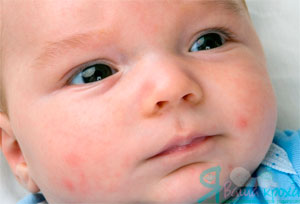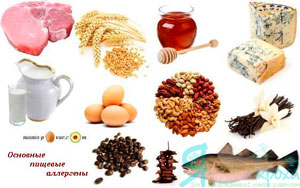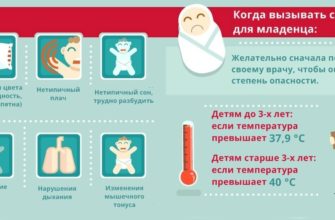
Food Allergies in Infants
The spread of allergic reactions affects not only adults, but also infants - we are talking primarily about food allergies. Since the course of allergies in babies is much more difficult than in adults, this issue should be addressed immediately. Many, for example, try to breastfeed their babies, but remember that food allergies in infants can be triggered by breast milk.
The reasons for the child's predisposition to allergies:
- If any of the parents of the child is susceptible to allergic reactions - the chance of becoming an allergic child increases. Typically, the tendency of one of the parents with a probability of 37% leads to allergies in the child, and the predisposition of each of the parents increases to 62%.
- The next important factor is the use by the expectant mother during pregnancy of the following products: vegetables and fruits of bright colors, milk, chicken eggs, chocolate, tonic drinks, nuts, honey and mushrooms. The use by the pregnant mother of these products increases the chances of the formation of an allergenic background in the child. Smoking, as well as the use of antibiotics by the mother during pregnancy, negatively affects the tendency of the unborn child to allergies.
- Diseases suffered by a child in infancy or hypoxia during pregnancy affect the formation of allergies. Such diseases include, first of all, intestinal infections and SARS.
- Failure to comply with the nutritional schedule of the nursing mother and the baby greatly increases the risk of allergies.
- The unreasonable transfer of a baby from breastfeeding to infant formula negatively affects susceptibility to allergies. Regular change of mixtures, feeding baby milk and the use of cheap mixtures significantly increases the risk of allergies, because it disrupts the work of the gastrointestinal tract in the baby.
In infants, the enzyme responsible for the digestion of food is poorly developed, so any new food is either not digested by the child, or is digested with great difficulty. Most often, a regular change of food products leads to their rejection by the body of the child, which leads to rejection of foods in the future.
What symptoms will allow the mother to recognize the presence of an allergic reaction in her baby, if it could not be prevented?
Allergies can occur in many ways: skin diseases, respiratory and gastrointestinal diseases:
- Signs of allergic skin diseases are redness of the skin, rash, itching, peeling, profuse sweating, Quincke's edema, urticaria.
- Respiratory diseases are usually expressed in severe allergic rhinitis.
- Gastrointestinal diseases are expressed in constipation, diarrhea, frequent spitting up, vomiting reflexes, flatulence.
The most serious and life-threatening of the above diseases is Quincke's edema. With this disease, some parts of the body swell, there is an attack of suffocation, a lack of oxygen, the child’s voice quickly sets. In case of the appearance of such symptomsyou need to see a doctor quickly!
What foods are not recommended to feed the baby?
- In 85% of cases, babies are allergic to consuming cow's milk (protein).
- The next product (62% of allergies) is a chicken egg.
- Gluten-containing foods, bananas, buckwheat, potatoes, soy, less often corn, and even less often, various types of meat are dangerous
If any allergy symptoms occur, the mother needs to show her child to a specialist to identify the product for which he is allergic and to exclude him from the child’s diet. To do this, you need to start a food journal in which the child’s use of various foods and his reaction to them will be recorded.
Frequent cases of food allergies in a child can lead to the development of other types of allergic diseases (not just food ones).
Video
Allergy treatment in a child up to a year
 Treatment of allergies, as a rule, consists in a strict diet, excluding the alleged allergen from the diet. You can give some tips on which foods to exclude a nursing mother from her own diet in order to protect her child from allergies:
Treatment of allergies, as a rule, consists in a strict diet, excluding the alleged allergen from the diet. You can give some tips on which foods to exclude a nursing mother from her own diet in order to protect her child from allergies:
- Products containing artificial colors.
- Preservatives
- Fried food.
Important article: what can a nursing mother eat (grocery list)
This should reduce the child’s exposure to allergies, since most allergens are found in the above products.
If allergies occur as a result of feeding with artificial mixtures, you should switch to mixtures where the protein of cow's milk is broken down to the level of amino acids.
These simple rules will allow your child to get rid of most allergic symptoms quickly enough.
Read on: diathesis in infants









Enterosgel was prescribed for allergies, I gave it to my daughter when I treated her with a diathesis - it helped a lot. Of course, it is difficult to determine which product the child poured onto, especially since you have already entered all the products and the child on the general table. Of course, the doctor put us on a diet, and with Enterosgel we removed all allergens and toxins from the body. Antihistamines during exacerbation only.